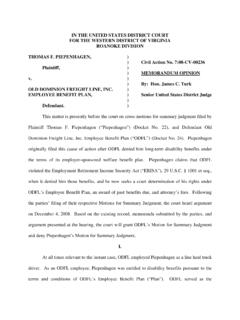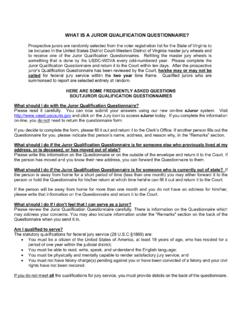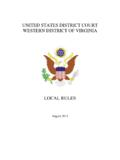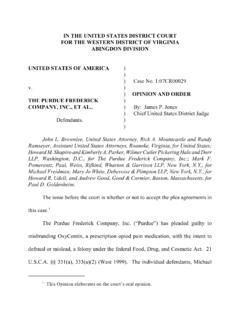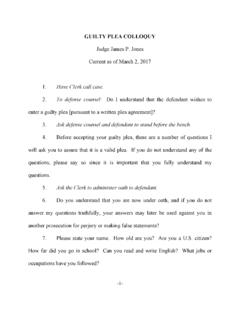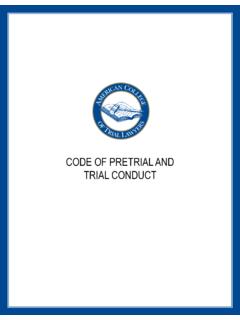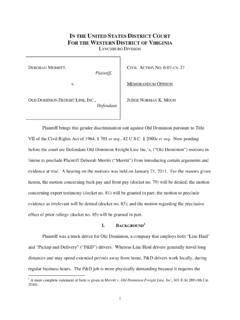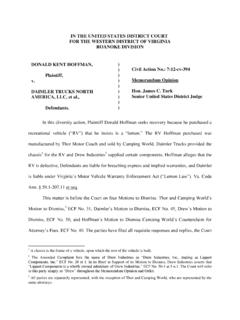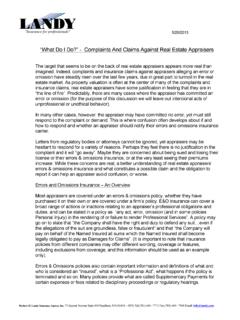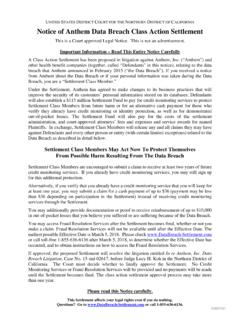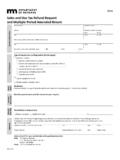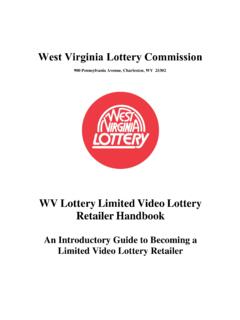Transcription of PRO SE HANDBOOK - United States District Court
1 PRO SE HANDBOOK Last revised: September 2016 Disclaimer: The contents of the Pro Se HANDBOOK are provided for informational purposes only and do not constitute legal advice. This HANDBOOK does not take the place of the Federal Rules, this Court s Local Rules, or the individual practices of the Judges of this Court . If there is any conflict between this HANDBOOK and the applicable rules, the rules govern. This HANDBOOK is not intended for use by litigants who are incarcerated. United States District Court Western District of Virginia Page 2 Table of Contents WELCOME/INTRODUCTION .. 3 A WORD OF CAUTION .. 5 ALTERNATIVES TO FILING A LAWSUIT.
2 6 SEVEN QUESTIONS TO CONSIDER BEFORE FILING A LAWSUIT .. 8 1. VALID CLAIM: Have I suffered a real injury or wrong? .. 8 2. JURISDICTION: Is a federal Court the appropriate place to file my lawsuit? .. 8 3. VENUE: Is the Western District of Virginia the appropriate federal Court in which to file my lawsuit? .. 9 4. STATUTE OF LIMITATIONS: Will my claim be timely if I file it now? .. 10 5. EXHAUSTION: Have I pursued all other available remedies prior to filing my lawsuit? .. 10 6. DEFENDANTS: Am I able to determine and name the proper defendants for my action? .. 11 7. SUPPORTING FACTS: Will I be able to establish sufficient facts to support my claims? .. 12 BRINGING YOUR LAWSUIT .. 13 Write a Complaint .. 13 File the 15 Provide Service of Process.
3 15 After your lawsuit has been filed .. 17 Other important information .. 17 WHAT HAPPENS AT A Court PROCEEDING? .. 20 How is the courtroom set up? .. 20 How do I dress, where do I sit, and what do I say?.. 21 What is a hearing? .. 21 What should I expect at a hearing? .. 21 What should I expect at a trial? .. 22 NOTICE OF APPEAL .. 24 LEGAL RESEARCH AN OVERVIEW .. 25 GLOSSARY OF COMMON LEGAL TERMS .. 27 SCHEDULE OF REVISIONS TO PRO SE HANDBOOK .. 30 United States District Court Western District of Virginia Page 3 WELCOME/INTRODUCTION Welcome to the United States District Court for the Western District of Virginia. This HANDBOOK has been prepared specifically for individuals who will be appearing pro se to file and pursue a CIVIL case in this Court .
4 A pro se litigant is someone who has chosen, for whatever reason, to represent himself/herself as a party to a lawsuit. The purpose of this HANDBOOK is to provide the pro se litigant with a practical and informative resource that will assist in the decision-making process and in the filing of a civil lawsuit when choosing not to retain the aid of a licensed attorney. You should never rely entirely on this HANDBOOK , and it should not be your only resource. Rather, this HANDBOOK should be considered a procedural aid or a starting point to help you should you choose to file a lawsuit and represent yourself. This ha ndbook is NOT intended for people who want to defend themselves in a criminal case without an attorney or those who are incarcerated.
5 The rules and procedures that a party must follow in a civil case may be difficult to understand. You should seriously consider the risks of representing yourself and the benefits of obtaining professional legal assistance. If you decide to represent yourself, you are responsible for following the Federal Rules of Civil Procedure, the Local Rules of this Court , and the law. You should ALWAYS review the law before taking any action in your lawsuit. If you have questions or need to know more about the law, it is up to you to research the answers yourself. Employees of the Court can answer general questions about Court procedures, but they cannot give legal advice, as they are prohibited under Title 28 of the United States Code ( ), Section 955.
6 For example, they cannot do any of the following: Recommend a legal course of action or suggest ways to help you win your case; Explain the result of taking or not taking an action in a case; Answer whether jurisdiction is proper in a case; Answer whether a complaint properly presents a claim; Give you inside information about judges or other Court personnel or predict when a judge may decide any issue; Interpret the meaning of any judicial order; Provide information on or interpret the law, federal rules, local rules, or standing orders; Calculate response times or deadlines; or Conduct legal research. Employees of the Court can do the following: Provide basic instructions on how to execute a task ( , number of copies, use of forms, etc.)
7 ; Provide information as to compliance with this Court s policies; and Provide information that can be found on a case docket. United States District Court Western District of Virginia Page 4 The Court s website address is The website contains links to the Federal Rules of Civil Procedure, the Local Rules of this Court , Standing Orders, and other useful information. All of the forms mentioned in this HANDBOOK can be found under the Forms link on the website. All Administrative Office of the Courts (AO) forms mentioned can be found under the AO National Forms link. In our continuing effort to provide better service and information to the public, we welcome any comments or suggestions for improving this HANDBOOK .
8 Please send your comments to: Clerk of Court , 210 Franklin Road , Suite 540, Roanoke, VA 24011-2208. United States District Court Western District of Virginia Page 5 A WORD OF CAUTION Representing yourself in a civil suit can be a difficult and time-consuming ordeal and carries certain risks and responsibilities that pro se litigants should be aware of before they proceed. If you decide to proceed pro se, you will be responsible for learning about and following all the procedures that govern the legal process. Before you make the decision to become a pro se litigant, it is strongly advisable to at least find out if you have other options. Because representing yourself in a lawsuit is difficult, the Court urges you to think seriously about getting an attorney, if at all possible.
9 Rule 11 of the Federal Rules of Civil Procedure prohibits filing lawsuits that are clearly frivolous or filed merely for purposes of harassment. If after reviewing your complaint the Court determines that you have filed a lawsuit for an improper or clearly unnecessary purpose, it may impose sanctions against you, including ordering you to pay a fine to the Court or to pay the legal fees of the person against whom you filed the lawsuit. In certain types of cases, if you lose, you may be required to pay the legal fees of the winning party. In all cases, if you lose you may be required to pay some of the costs the winning party incurred in the course of the lawsuit. United States District Court Western District of Virginia Page 6 ALTERNATIVES TO FILING A LAWSUIT As you may soon find out, bringing a lawsuit takes a considerable amount of time, money, and energy.
10 Before filing a lawsuit, you may want to consider other alternatives to solve your dispute or problem. Here are a few suggestions: Attempt to Work Things Out: Consider talking directly to the person/people who you think might be responsible for causing the problem. If you approach someone respectfully and give them a real opportunity to talk, that person may be more likely to respond in a positive manner than if your first contact after the problem arises is to threaten that person with a lawsuit. Consider Contacting Governmental or Private Agencies: Consider whether there are other processes you could use, or agencies you could enlist, to address your problem.
